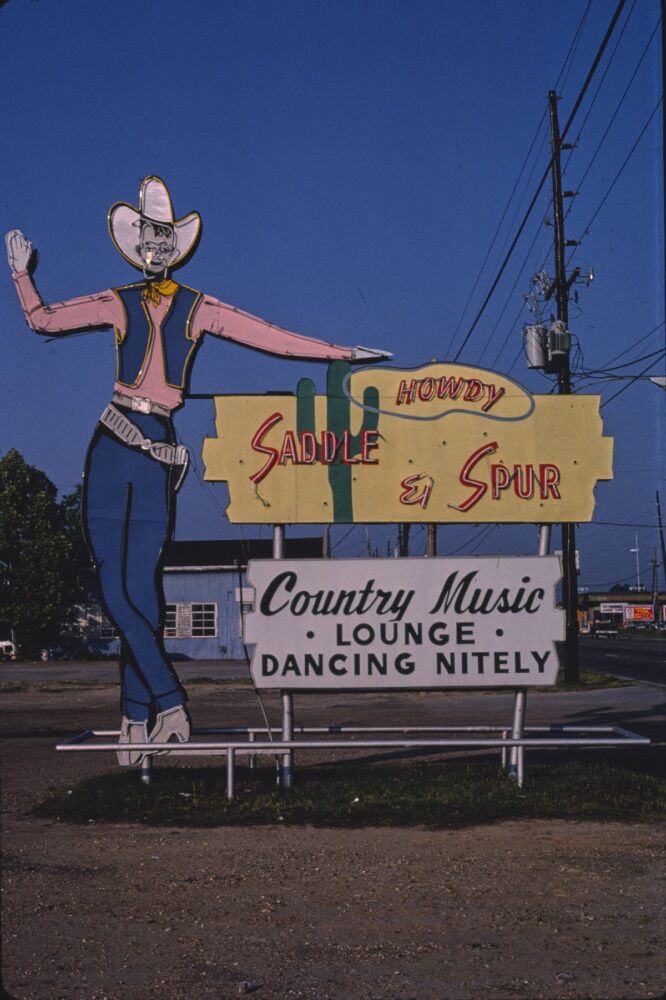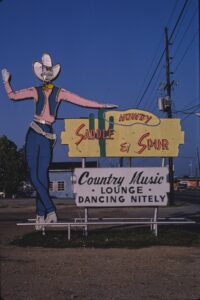Godforsaken, Imbecilic, and Insane
John Dufresne’s Louisiana Power & Light
Published: November 30, 2020
Last Updated: February 28, 2021

Photo by John Margolies, Library of Congress
Monroe’s Saddle and Spur Lounge, photographed in 1982.
Billy Wayne Fontana has a past. A sordid history. A soiled family tree that, with roots exposed and bark peeled back for all to see, is the talk of Ouachita Parish, where everyone knows everything about Billy Wayne except, that is, Billy Wayne, heart and unfortunate soul of John Dufresne’s 1994 debut novel, Louisiana Power & Light.
The Fontanas are cursed, they say, unwhispered, up in Monroe. The family is “unblest and bedeviled.” Back since around 1840, when Peregrine Fontana “sloshed his way out of the spongy gumbo” west of Vicksburg, there’s been “bad water in the gene pool.” His twin albino boys, Mangham and Bosco, sire generations of sons, only sons, for the Fontanas never can beget a daughter—curbs incest, people say.
Each generation is more godforsaken, imbecilic, and insane than the last. Napoleon Fontana contracts leprosy after attempting to manufacture ladies’ handbags from armadillo skins. De Soto Fontana sets fire to a theater after being refused entrance to a Walt Disney cartoon matinee for possessing neither money nor shoes. Positive Wassermann “Pee Dubya” Fontana dies in Monroe’s Mental Jail; his forefather Tennis plunges, straitjacketed, from a transport train into the Mississippi River. The Fontanas are the subject of at least one scholarly paper in the Louisiana Journal of Procreation and the “most executed white family in the history of Louisiana,” according to whoever tallies such things. A simple case of reverse Darwinism at work, one college professor hypothesizes, a “survival of the sorriest.”
And then there’s poor Billy Wayne, Pee Dubya’s only son, end of the Fontana family line. Orphaned in infancy and abandoned to the holy care of the Sisters of St. Francis Hospital, Billy Wayne inspires hope that the Fontana hex may be reversed. He’s a teenage virtuoso of the Catechism, learns to speak “Latin before Southern,” and looks forward to priestly ordination. But damnation arrives in the form of Earlene deBastrop, an aspiring country songwriter hospitalized for nymphomania, and the first of Billy Wayne’s two future ex-wives. The young elopers fall in with a circle of Monroe-area misfits, who all seem touched by the same Fontanic blight. There’s an epileptic motel owner, an alien abductee who believes Jesus was an astrologer, and a lawyer who sponsors a carp rodeo in his backyard swimming pool. Whatever it is that afflicts the Fontanas, Dufresne writes, “maybe afflicts us all.”
Louisiana Power & Light is, as should be obvious by now, a satirical farce—screwball Southern Gothic, I’d call it. Readers might find it hard not to be reminded of Ignatius J. Reilly—who makes a cameo appearance—and his pals. But in Dufresne’s novel, Billy Wayne Fontana and friends may just rank as whatever’s dumber than a confederacy of dunces. A consortium of morons? A federation of halfwits? Take your pick.
Published in 1994, the novel expands on a short story collected in Dufresne’s first book, The Way That Water Enters Stone. Though most of those stories are set in his hometown of Worcester, Massachusetts, the city of Monroe, where he taught creative writing at Northeast Louisiana University (now the University of Louisiana at Monroe), trickles in. “I don’t understand why there is something so attractive about Monroe,” he told a reporter in 2008, two decades after leaving for a teaching gig at Florida International University. “It may be that it was so strange—people speaking in a different dialect . . . the long lines of families. Everybody knows everyone else’s stories. I found it fascinating and still do.” A sequel of sorts to Louisiana Power & Light, Deep in the Shade of Paradise, furthered the adventures of the Fontana clan.
As Dufresne’s Bildungsroman builds, Billy Wayne’s life is looking up. He moves out of the motel and into a proper home. Earns a dream job brush hogging for the novel’s title electrical company. And, with his second wife, Tami Lynne, fathers a pair of children—sons, of course. But each day is a present reminder of his Fontana past, and, with the whole of Monroe watching and waiting for him to muck it all up, Billy Wayne begins to drown in his own grubby gene pool.
At its heart, Louisiana Power & Light is a story about the darkness that surrounds powerlessness, specifically the powerlessness experienced when encountering the inescapable pull of the past. “We keep revising our past to keep it consistent with who we think we are,” Dufresne writes at the start of the novel, in a neat rewrite of Faulkner’s “The past is never dead. It’s not even past.”
By book’s end, Billy Wayne finally sees the light. “The past is important,” he confesses to Tami Lynne. “Mine is anyway.”
“And crowded,” she responds, revealing the darkest, and simplest, of truths about human history.
And with that, Billy Wayne learns that with enlightenment comes power, before descending into the finality that is the ultimate darkness.
Rien Fertel is writing a book about pelicans.
